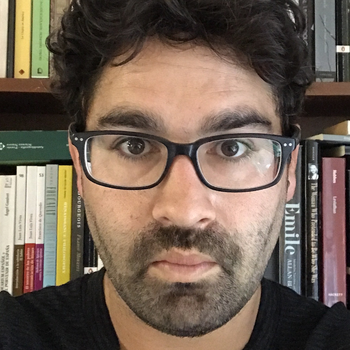Keith Budner (University of California, Berkeley)
Early Career Fellow in Research Area 1: "Competing Communities"
September 2019–July 2020
Cartographic Lineages of Fictionality in Medieval and Early Modern Iberia
Keith Budner's project at EXC 2020 examines the relationship between literary fictionality and mapmaking as mutually informing modes of world-picturing and world-creation. Using interdisciplinary methodologies that bridge textual criticism and visual analysis, and with a historical scope that spans Classical Antiquity, the Middle Ages and the Early Modern Period, the project will trace parallel developments within literary genres (romance, novel, lyric, historiography) and within new cartographic technologies for representing geographic knowledge and information (cross-cultural contact and global navigation, the rediscovery of the Ptolemaic grid, and the rise of the printing press). From a theoretical perspective, the project situates the cartographic lineage of literary fictionality between two competing, though not wholly antithetical, epistemological poles: that of providing an objective representation of the natural world, and that of enticing the reader-viewer to imaginatively enter and vicariously inhabit such representations of the world, or a world. The map's capacity for vicarious participation further relates cartography to the realm of the imagination, especially in the field of games and play. The map as an imaginative object can thus expand our understanding of fiction-making beyond a purely representational or mimetic paradigm to one that instead aligns with anthropological, philosophical and art historical theories of play as a symbolic act. While exploring this network of concepts, Keith Budner will make use of his ongoing Digital Humanities project on 'Early Modern Printer-Scholars' to track the technical re-use and re-publication of early printed maps across different print houses and printed works.
Keith Budner received his doctorate from the University of California Berkeley in 2019. His dissertation, which he is revising and expanding into a book during his time as a postdoctoral fellow at EXC 2020, analyses how late medieval and early modern Spain constructed a pluralistic communal image out of its classical-colonial past as the Roman province of Hispania, and places particular emphasis on the cultural contributions of Sephardic Jews and Judeoconversos. His previous research on issues such as the representation of Moors and Moriscos in Spanish romances and historiographies, and on the relationship between Cervantes' Don Quixote and Classical myths and Renaissance visual art has been supported by institutions such as the Huntington Library, the Rare Book School, the Social Science Research Council and the Townsend Center for the Humanities.
